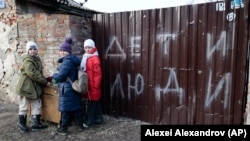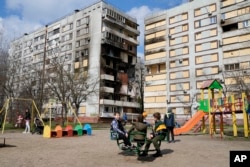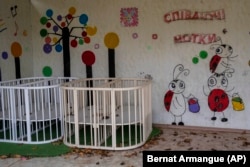On May 1, Vice News published an exclusive interview with Russia’s Presidential Commissioner for Children's Rights, Maria Lvova-Belova. Lvova-Belova is the top Russian official managing the camps and other institutions where Russia has deported Ukrainian children.
In March, the International Criminal Court issued arrest warrants for Lvova-Belova and Russian President Vladimir Putin, for their alleged role in the abduction of children from Ukraine.
Lvova-Belova used the interview to deny those charges.
She called the accusations of forced deportations absurd, arguing that unlike Ukraine, “we don’t use children for political purposes.”
Lvova-Belova said Russia is right to “evacuate people, children from areas that threaten their lives and security.”
“These kids are already in Russia. These are children from those regions that have recognized themselves as Russia. There is nothing to encourage here. And it is true that several thousand children were sent to these camps by agreement with their parents. It was absolutely voluntary,” she said.
Lvova-Belova’s claim that the children were “already in Russia,” or that all the children were transferred to and kept in the camps on an “absolutely voluntary” basis, is false.
The International Criminal Court, the International Commission of Inquiry on Ukraine, media reports, academic institutions, government bodies and non-governmental organizations have all uncovered evidence pointing to Moscow’s illegal efforts to forcibly deport children from Ukraine to Russia and Russia-occupied territory.
The Ukrainian government said nearly 19,393 children had been deported to Russia as of April 23, and only 361 of those children had been returned to Ukraine.
That is a fraction of the hundreds of thousands of children both Russian and Ukrainian sources say have gone to Russia since Russia’s full-scale invasion of Ukraine on February 24, 2022.
Lvova-Belova also sidestepped the fact that it is Russia which is threatening the “lives and security” of Ukrainian children through its invasion and occupation of Ukrainian territory.
The International Commission of Inquiry on Ukraine, established by the United Nations Human Rights Council, said that the evacuation of children “by a party to the armed conflict” is prohibited under international humanitarian law, although there are exceptions for a temporary evacuation due to health or safety concerns.
Parental consent is also required.
The commission said Russia had failed to satisfy the requirements set forth by international humanitarian law in the cases it had examined.
It wrote:
“The transfers were not justified by safety or medical reasons. There seems to be no indication that it was impossible to allow the children to relocate to territory under Ukrainian Government control. It also does not appear that Russian authorities sought to establish contact with the children’s relatives or with Ukrainian authorities. While the transfers were supposed to be temporary, due to a variety of reasons, most became prolonged, and parents or legal guardians and children encountered an array of obstacles in establishing contact, achieving family reunification, and returning the children to Ukraine.”
An Associated Press investigation found that Russia “deported Ukrainian children to Russia or Russian-held territories without [parental] consent, lied to them that they weren’t wanted by their parents, used them for propaganda, and given them Russian families and citizenship.”
The Associated Press reported the practice of “raising the children of war in another country or culture can be a marker of genocide, an attempt to erase the very identity of an enemy nation.”
Others share that view.
On February 19, U.S. Secretary of State Antony Blinken told CBS News' "Face the Nation" program that among Russia’s other alleged crimes against humanity in Ukraine, the forcible separation of children from their families has been regarded by international tribunals as genocide.
On April 27, the Parliamentary Assembly of the Council of Europe (PACE) voted to designate the kidnapping and deportation of Ukrainian children by Moscow to Russia as “genocide.”
PACE said the transfers of Ukrainian children were “clearly being planned and organized in a systematic way” by the Russian state, subjecting them to a process of “russification” through re-education and exposure to propaganda with the goal of “annihilating every link to and feature of their Ukrainian identity."
A report released by the Organization for Security and Co-operation in Europe on May 4 found that rather than trying to return the Ukrainian children to their families, Russia "creates various obstacles for families seeking to get their children back.”
These reports have included or been corroborated by witness testimony.
The Conflict Observatory, an American non-governmental organization funded by the U.S. State Department, said that of the 43 Russian camps and facilities it had identified, at least 32 “appear engaged in systematic re-education efforts that expose children from Ukraine to Russia-centric academic, cultural, patriotic, and/or military education.”
That was corroborated by an investigation by Sky News, which found “evidence that suggests they are russifying and militarizing children for propaganda purposes.
Some parents did sign off on sending their children to Russian camps, and the children were returned as “originally scheduled,” the Conflict Observatory reported.
However, the observatory found that “the ability of parents to provide meaningful consent may be considered doubtful" due to wartime conditions and the “implicit threat from occupying forces.”
In approximately 10% of camps, the observatory found that “children’s return to Ukraine was allegedly suspended.”
The U.K.'s Guardian newspaper spoke to eight parents who had voluntarily sent their kids to summer camps, only to see Russia refuse to send them back.







